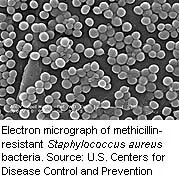Hospital-onset invasive cases involving the 'superbug' dropped by 54 percent
WebMD News from HealthDay

By Kathleen Doheny
HealthDay Reporter
MONDAY, Sept. 16 (HealthDay News) -- Potentially fatal invasive infections from methicillin-resistant Staphylococcus aureus (MRSA) are declining in the United States, according to a new government report.
In a separate study, other researchers have found that high exposure to swine manure spread in crop fields, along with living near swine livestock operations, appears to be linked with MRSA community-acquired infections, a type that continues to puzzle the experts.
MRSA is considered a "superbug" because of the bacteria's ability to fight off treatment, including the antibiotic methicillin. It can wreak havoc in health-care settings such as hospitals and nursing homes, especially among elderly and immune-compromised patients, but it also can occur in the community at large.
Both new studies were published online Sept. 16 in JAMA Internal Medicine.
"Overall, it's good news," said Dr. Raymund Dantes, who conducted the first study while an epidemiologist at the U.S. Centers for Disease Control and Prevention. "The most severe kinds of MRSA infections are declining in the U.S."
In 2011, over 30,000 fewer invasive MRSA infections occurred than in 2005, Dantes said. Total infections in 2011 were estimated at about 80,400.
Invasive MRSA infections with onset at the hospital dropped the most, with a 54 percent decline, Dantes said. The smallest decline was in community-associated infections, dropping just 5 percent.
Another type -- health-care associated community-onset infection -- dropped about 28 percent. This describes MRSA in people who've had a lot of exposure to health-care settings but are believed to have contracted the infection in the community, said Dantes, who is now an assistant professor of medicine at Emory University.
The researchers collected information from selected counties in nine U.S. states, then took other information into account to estimate the national incidence rates.
"The focus of our study was to quantify the most severe MRSA infections out there," Dantes said. The researchers did not track noninvasive MRSA infection, the kind that affects skin and soft tissue, but only invasive, "the kind of infection that would kill people." These MRSA infections can affect the bloodstream, bones, or other areas.
While Dantes can't say for sure what is behind the decline, he suspects better infection-control practices have helped, such as isolating patients who have MRSA in a hospital or other health-care facilities, as well as better barrier precautions such as doctors wearing sterile gowns.
"The next step in trying to reduce invasive MRSA infections is actually looking at folks outside the health-care setting," Dantes said.
The second study, on swine-related infection, may provide some clues. Researchers from Johns Hopkins Bloomberg School of Public Health evaluated more than 5,700 patients with MRSA or skin and soft tissue infections, comparing them to nearly 3,000 healthy patients.
source : Serious MRSA Infections in U.S. Declining: CDC








